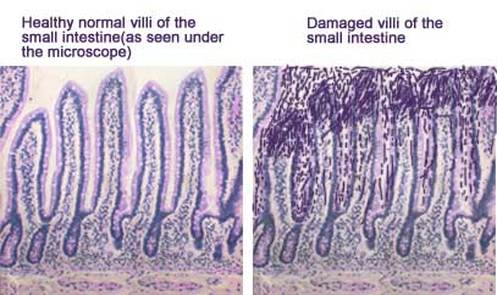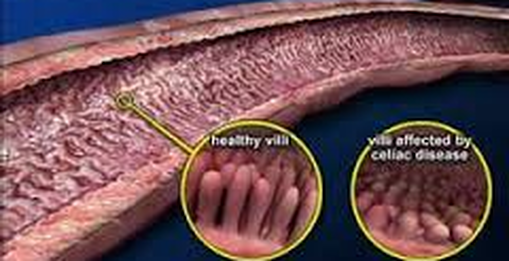Millions of people suffer around the world
without knowing, they have
GLUTEN SENSITIVITY
without knowing, they have
GLUTEN SENSITIVITY
What is
Gluten Sensitivity?
Gluten sensitivity is a genetic autoimmune disorder where the ingestion of gluten leads to damage in the small intestine. It is estimated to affect 1 in 100 people worldwide.
Two and one-half million Americans are undiagnosed and are at risk for long-term health complications.
When people with gluten sensitivity eat gluten (a protein found in wheat, rye and barley), their body mounts an immune response that attacks the small intestine.
These attacks lead to damage on the villi, small fingerlike projections that line the small intestine, that promote nutrient absorption. When the villi get damaged, nutrients cannot be absorbed properly into the body.
Gluten sensitivity is hereditary, meaning that it runs in families.
People with a first-degree relative with gluten sensitivity (parent, child, sibling)
have a 1 in 10 risk of developing gluten sensitivity.
Gluten sensitivity is also known as celiac disease, celiac sprue, non-tropical sprue, and gluten sensitive enteropathy.
Gluten Sensitivity?
Gluten sensitivity is a genetic autoimmune disorder where the ingestion of gluten leads to damage in the small intestine. It is estimated to affect 1 in 100 people worldwide.
Two and one-half million Americans are undiagnosed and are at risk for long-term health complications.
When people with gluten sensitivity eat gluten (a protein found in wheat, rye and barley), their body mounts an immune response that attacks the small intestine.
These attacks lead to damage on the villi, small fingerlike projections that line the small intestine, that promote nutrient absorption. When the villi get damaged, nutrients cannot be absorbed properly into the body.
Gluten sensitivity is hereditary, meaning that it runs in families.
People with a first-degree relative with gluten sensitivity (parent, child, sibling)
have a 1 in 10 risk of developing gluten sensitivity.
Gluten sensitivity is also known as celiac disease, celiac sprue, non-tropical sprue, and gluten sensitive enteropathy.
44 Gluten Facts
That We Should Know About
That We Should Know About
- Everyone with celiac disease is gluten sensitive, but not everyone with gluten sensitivity will develop celiac disease
- There are over 200 medical conditions that gluten can either cause, contribute to, or make worse.
- Gluten can cause autoimmune disease
- Gluten can cause leaky gut
- Gluten is a common cause of unexplained iron deficiency anemia
- Gluten is a common cause of vitamin B12 deficiency
- There is a form of gluten in corn that can cause inflammatory damage
- There is no such thing as a gluten free oat
- Excessive gluten consumption can cause both excessive weight gain or loss
- Lab tests for celiac disease aren’t specific and have a tendency to deliver false negatives
- Villous atrophy can also be caused by corn, soy, dairy, and parasite infections.
- Eating processed “gluten free’ food products is a bad idea
- Some medications have been shown to mimic gluten sensitivity
- Gluten can cause asthma symptoms
- Vitamin C can help heal inflammatory damage caused by gluten.
- Gluten can cause dizziness and loss of balance (Ataxia)
- Gluten can cause seizures
- Gluten is a migraine headache trigger
- Gluten can contribute to testosterone problems in men.
- Gluten can cause thyroid disease
- Gluten can cause nerve pain and neuropathy
- Gluten can cause 6 types of skin disease
- Gluten can be a trigger in autoimmune arthritis
- Gluten can cause damage in doses as low as 20 ppm (1 breadcrumb)
- Gluten sensitivity is completely different from a wheat allergy
- Gluten can cause liver damage
- Gluten can cause your gallbladder to malfunction
- Casein, a protein in dairy, can mimic gluten
- There are hundreds of different kinds of gluten proteins found in grains
- Sometimes gluten gets blamed for health problems that are caused by exposure to pesticides
- Sometimes gluten gets blamed for health problems caused by other proteins found in grain.
- Children with learning disorders often respond well to a gluten free diet
- Processed food can be cross contaminated with gluten up to 41% of the time.
- As many as 92% of the people following a gluten free diet continue to have health problems because of cross contamination, processed food, and consumption of corn, rice, sorghum and other grains.
- Gluten can be found in orthodontic materials
- It can take 3 years to fully recover from gluten induced disease.
- Gluten free on the label doesn’t make the food healthy.
- The best way to lab test for gluten sensitivity issues is measuring DNA
- Most doctors are as in the dark about gluten as the average person because the focus in medical school is nutrition deprived
- Gluten can cause joint pain
- Gluten can cause IBS
- The gluten free diet is not dangerous to follow if you don’t have gluten sensitivity
- Gluten in cosmetics and skin products can cause health problems
- You can take a quick and easy quiz to help you determine whether going gluten free is a good idea for you.
- Just click here <<===
Now this list could keep going on and on, but I stop at 44 because it is my 44th birthday!
Always looking out for you,
Dr. Osborne – The Gluten Free Warrior
The links in this post are extremely valuable and may help someone you Love. Please don’t be stingy and share the knowledge by passing this post along.
https://s.w.org/images/core/emoji/2/svg/1f642.svg
Read more at https://www.glutenfreesociety.org/44-gluten-facts-know/#RE11ICrAHZgrOxiy.99
Long Term Health Effects
Gluten sensitivity can develop at any age after people start eating foods or medicines that contain gluten. Left untreated, celiac disease can lead to additional serious health problems.
https://celiac.org/celiac-disease/understanding-celiac-disease-2/what-is-celiac-disease/#dDywwaOpvxPgaUzD.99
Long-Term Health Conditions
Malignancies
Other Autoimmune Disorders
Gluten sensitivity is associated with a number of autoimmune disorders, with the most common being thyroid disease and Type 1 Diabetes.
Learn about Associated Autoimmune Disorders
Symptoms
There are more than 200 symptoms associated with celiac disease, which makes diagnosis difficult. A significant percentage of people with celiac disease, both adults and children, have no or minimal symptoms.
Learn about the Common Symptoms of Celiac Disease
CDF offers a Symptoms Checklist to help you and your physician determine if you should be tested for celiac disease.
Complete the Symptoms Checklist
Screening and Diagnosis
A simple blood test is available to screen for celiac disease. People with celiac disease who eat gluten have higher than normal levels of certain antibodies in their blood. These antibodies are produced by the immune system because it views gluten (the proteins found in wheat, rye and barley) as a threat. You must be on a gluten-containing diet for antibody (blood) testing to be accurate.
The only way to confirm a celiac disease diagnosis is by undergoing an endoscopic biopsy of the small intestine.
Learn about Screening and Diagnosis
Non-Celiac Wheat Sensitivity
Some people experience symptoms found in celiac disease, such as “foggy mind”, depression, ADHD-like behavior, abdominal pain, bloating, diarrhea, constipation, headaches, bone or joint pain, and chronic fatigue when they have gluten in their diet, yet do not test positive for celiac disease. The terms non-celiac gluten sensitivity (NCGS) and non-celiac wheat sensitivity (NCWS) are generally used to refer to this condition, when removing gluten from the diet resolves symptoms.
Learn about Non-Celiac Wheat Sensitivity
Treatment
Currently, the only treatment for celiac disease and non-celiac wheat sensitivity is lifelong adherence to a strict gluten-free diet.
People living gluten-free must avoid foods with wheat, rye and barley, such as bread and beer. Ingesting small amounts of gluten, like crumbs from a cutting board or toaster, can trigger intestinal damage.
Learn about the Gluten-Free Diet
Annual Follow-Up
Once diagnosed, annual follow-up with your physician is necessary to monitor nutritional deficiencies and your compliance with a gluten-free diet, as well as assess for associated conditions.
Learn about Annual Follow-Up
Finding the Right Doctor
Celiac Disease Foundation can help you find the right doctor to discuss symptoms, diagnose, and treat celiac disease.
Our nationwide Healthcare Practitioner Directory lists primary care physicians and specialists,and dietitians and mental health professionals, experienced in celiac disease and non-celiac wheat sensitivity.
Find a Healthcare Practitioner
Gluten sensitivity can develop at any age after people start eating foods or medicines that contain gluten. Left untreated, celiac disease can lead to additional serious health problems.
https://celiac.org/celiac-disease/understanding-celiac-disease-2/what-is-celiac-disease/#dDywwaOpvxPgaUzD.99
Long-Term Health Conditions
- Iron deficiency anemia
- Early onset osteoporosis or osteopenia
- Infertility and miscarriage
- Lactose intolerance
- Vitamin and mineral deficiencies
- Central and peripheral nervous system disorders
- Pancreatic insufficiency
- Gall bladder malfunction
- Neurological manifestations, including ataxia, epileptic seizures, dementia, migraine, neuropathy, myopathy and multifocal leucoencephalopathy
Malignancies
- Non-Hodgkin lymphoma (intestinal and extra-intestinal, T- and B-cell types)
- Small intestinal adenocarcinoma
- Esophageal carcinoma
- Papillary thyroid cancer
- Melanoma
Other Autoimmune Disorders
Gluten sensitivity is associated with a number of autoimmune disorders, with the most common being thyroid disease and Type 1 Diabetes.
Learn about Associated Autoimmune Disorders
Symptoms
There are more than 200 symptoms associated with celiac disease, which makes diagnosis difficult. A significant percentage of people with celiac disease, both adults and children, have no or minimal symptoms.
Learn about the Common Symptoms of Celiac Disease
CDF offers a Symptoms Checklist to help you and your physician determine if you should be tested for celiac disease.
Complete the Symptoms Checklist
Screening and Diagnosis
A simple blood test is available to screen for celiac disease. People with celiac disease who eat gluten have higher than normal levels of certain antibodies in their blood. These antibodies are produced by the immune system because it views gluten (the proteins found in wheat, rye and barley) as a threat. You must be on a gluten-containing diet for antibody (blood) testing to be accurate.
The only way to confirm a celiac disease diagnosis is by undergoing an endoscopic biopsy of the small intestine.
Learn about Screening and Diagnosis
Non-Celiac Wheat Sensitivity
Some people experience symptoms found in celiac disease, such as “foggy mind”, depression, ADHD-like behavior, abdominal pain, bloating, diarrhea, constipation, headaches, bone or joint pain, and chronic fatigue when they have gluten in their diet, yet do not test positive for celiac disease. The terms non-celiac gluten sensitivity (NCGS) and non-celiac wheat sensitivity (NCWS) are generally used to refer to this condition, when removing gluten from the diet resolves symptoms.
Learn about Non-Celiac Wheat Sensitivity
Treatment
Currently, the only treatment for celiac disease and non-celiac wheat sensitivity is lifelong adherence to a strict gluten-free diet.
People living gluten-free must avoid foods with wheat, rye and barley, such as bread and beer. Ingesting small amounts of gluten, like crumbs from a cutting board or toaster, can trigger intestinal damage.
Learn about the Gluten-Free Diet
Annual Follow-Up
Once diagnosed, annual follow-up with your physician is necessary to monitor nutritional deficiencies and your compliance with a gluten-free diet, as well as assess for associated conditions.
Learn about Annual Follow-Up
Finding the Right Doctor
Celiac Disease Foundation can help you find the right doctor to discuss symptoms, diagnose, and treat celiac disease.
Our nationwide Healthcare Practitioner Directory lists primary care physicians and specialists,and dietitians and mental health professionals, experienced in celiac disease and non-celiac wheat sensitivity.
Find a Healthcare Practitioner
Videos on Gluten Sensitivity
38:55
Wheat Belly Interview with Dr. William DavisJennifer Fugo14,714 views
34:59
Wheat Belly Interview with Dr. William DavisJennifer Fugo14,714 views
34:59
- William Davis, MD: Wheat Bellycyacyl473 views
16:13 - Wheat Belly: An Unintended ConsequenceRiordan Clinic72,838 views
46:57 - Dr. William Davis: Wheat Belly, Going Gluten-Free, & Why Grains Cause Heart DiseaseAbel James10,631 views
1:01:05 - 'Wheat Belly' Book Review READ THIS BOOK! William Davis, MDjunbug102912,033 views
30:51 - PaleoRunner: Wheat Belly - William DavisAaron Olson1,220 views
15:12 - O World Project Interview - Dr. William Davis - author of 'Wheat Belly'OWorldProject16,161 views
35:14 - A4M - Gut, Brain and Autoimmune Disorder Symposium Preview - William Davis, MDA4MEvents2,070 views
44:04 - The "Ancient" Grains: Emmer, Einkorn and Spelt WebinareOrganic9,537 views
1:19:398:35 - Dr. Tom O'Brian Interview with John DurantJamie Koonce1,037 views
29:57 - Wheat: The UNhealthy Whole Grain-Part 1William Davis307,939 views
19:59 - Benefits of Becoming Wheat-Free (3/6)ItsRainmakingTime5,189 views
10:01 - Wheat: A Perfect, Chronic Poison. Interview with Dr. William DavisThe Little Aussie Bakery & Cafe1,312 views
4:56 - Wheat Belly Thoughts - 2 Months inBrittDoesIt4,751 views
8:16 - Wheat Belly Book ReviewTiana M1,998 views
12:01 - The Overview | Wheat Belly's Dr. William Davis (Part 1)Julie Daniluk38,524 views
9:59 - Dr. William Davis Interview Part 1FOX64,584 views
- Why Gluten is bad for your health with Dr. William Davis, author of Wheat Belly"The Wellness Hour82,837 views
- NEW
- Interview with Dr. William Davis: Second EditionJosh Gitalis1,399 views
32:51 - William Davis - Wheatlessness: A 21st Century Health StrategyTheIHMC95,723 views
1:09:21 - Food Integrity Now: Wheat Belly with Dr. William DavisFood Integrity Now9,857 views
1:01:41 - Gluten Free Diet Tips by Wheat Belly Lifestyle NutritionistHigh Intensity Health25,353 views
46:43 - The Paleo Way - Pete Evans interviews William DavisThe Paleo Way with Pete Evans35,587 views
21:01 - Hazards of Modern Wheat with Dr. DavisDick Mellon633 views
46:19 - Wheat murder. Interview with William Davis author of Wheat BellyJeremy Hanson72,643 views
1:28:20 - William Davis - Wheat: The UNhealthy Whole GrainTheIHMC374,668 views
1:05:28:33 - Interview with Dr. William Davis Author of Wheat BellyJosh Gitalis5,429 views
19:38 - Prof. Jeff Volek - 'The Art and Science of Low Carb Living: Cardio-Metabolic Benefits and Beyond'Low Carb Down Under74,712 views
48:17 - Robert Lustig - Frontiers of ScienceUniversity of Utah College of Science33,028 views
1:15:01 - "Wheat Belly" with Dr. William DavisThe Randy & Christa Show13,877 views
20:57 - Dr. William Davis - The Dangers of Wheat-by Red Ice Creations April 29 2012destinicoach48,864 views
58:01 - Immunity Solution by Dr Joel Fuhrman, Part 1Ben Callihan44,660 views
51:17 - Dr David Perlmutter: Grain Brain, Eating Fat Makes You Smart, and Why (Brain) Size MattersAbel James127,815 views
image: https://www.glutenfreesociety.org/wp-content/uploads/Nutritional-Regulation-of-Thyroid-Hormones1-197x146.png
Dr. Osborne on Thyroid Nation Podcas
timage: https://www.glutenfreesociety.org/wp-content/uploads/2016/07/Gluten-and-Multiple-Sclerosis-193x146.png
How to Deal With MS Naturally
image: https://www.glutenfreesociety.org/wp-content/uploads/2016/07/Gluten-and-Dementia-146x146.jpg
Can Gluten Cause Dementia?image: https://www.glutenfreesociety.org/wp-content/uploads/2016/06/Causes-of-Fibromyalgia-Dr-Osborne-146x146.jpg
The Real Causes of Fibromyalgia with Dr. David Brady
Read more at https://www.glutenfreesociety.org/gluten-a-cause-of-migratory-arthritis-pain/#sqYy7uxbrK5BaB0C.99
Dr. Osborne on Thyroid Nation Podcas
timage: https://www.glutenfreesociety.org/wp-content/uploads/2016/07/Gluten-and-Multiple-Sclerosis-193x146.png
How to Deal With MS Naturally
image: https://www.glutenfreesociety.org/wp-content/uploads/2016/07/Gluten-and-Dementia-146x146.jpg
Can Gluten Cause Dementia?image: https://www.glutenfreesociety.org/wp-content/uploads/2016/06/Causes-of-Fibromyalgia-Dr-Osborne-146x146.jpg
The Real Causes of Fibromyalgia with Dr. David Brady
Read more at https://www.glutenfreesociety.org/gluten-a-cause-of-migratory-arthritis-pain/#sqYy7uxbrK5BaB0C.99




























